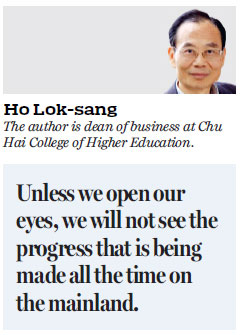GBA presents wealth of opportunities for HK
Updated: 2018-04-24 07:17
By Ho Lok-sang(HK Edition)
|
|||||||
Professionals' proposal for 'HK Cities' within region and legislators' eye-opening tour of member cities underline project's bright prospects, Ho Lok-sang writes
The past week saw two interesting developments relating to the Guangdong-Hong Kong-Macao Greater Bay Area. One is the release of a report from the Business and Professional Federation proposing the creation of "Hong Kong Cities" in the GBA that afford a lifestyle and amenities similar to those in Hong Kong, complemented with tax treatment and smooth boundary crossings between Hong Kong and the Chinese mainland. The other is the visit to the Bay Area of a delegation from the Legislative Council consisting of 23 pro-establishment and nine "pan-democrat" lawmakers. After visiting Shenzhen and Dongguan, and impressed with examples of innovation there, the legislators called on the Special Administrative Region government to cut red tape and embrace new technologies.
I was invited to join a discussion relating to this visit on Radio 3 on Friday. The other guests were Vicky Davies, vice-chairman of the BPF, Witman Hung, principal liaison officer for Hong Kong, Shenzhen Qianhai Authority and deputy to the National People's Congress, and Clarence Leung, chairman of the Youth Committee, Business and Professionals Alliance for Hong Kong. All guests shared enthusiasm about the national policy of strategically developing the Bay Area and all of us found the GBA offering Hong Kong a tremendous opportunity - just at the right time. As the BPF report writes: "Hong Kong is bursting at the seams. We struggle to find adequate and affordable land not just for housing but also for schools, hospitals, elderly care, etc. Hong Kong is already looking beyond its borders for physical development, for example, the University of Hong Kong-Shenzhen Hospital and the Chinese University of Hong Kong (Shenzhen)."

However, the prospect for the emergence of "Hong Kong Cities" in the GBA is not as exciting as the BPF report suggests. First of all, even though the opportunities are there, only the most versatile, the most competitive, and the most adaptive of Hong Kong's younger generation will take advantage of the opportunities for better living and better career development in the GBA. For many young people in Hong Kong, there is still a wall of misunderstanding and an imagined wall of differences in culture. This is suggested by the incoming messages from among the audience. Many in the audience thought the BPF proposal is trying to export our problems to the Bay Area instead of solving them at home, and that the difference in culture is too big for Hong Kong people to swallow.
They somehow thought that the idea is to move those who cannot afford Hong Kong's expensive housing costs to the mainland, where costs are lower. But the fact is Hong Kong people will not move anywhere unless they want to. It is highly unlikely that uncompetitive, low-skilled people, or those who think of mainland people as uncivil or uneducated, will want to move to the GBA. If Hong Kong people keep thinking that mainland people "jump queues", are impolite and unethical, they lose sight of the fact that this is a gross generalization and is unfair. Unless we open our eyes, we will not see the progress that is being made all the time on the mainland.
I am glad that the legislators made their trip to see for themselves developments throughout the GBA. With two special administrative regions (Hong Kong and Macao) and nine cities, the population in the GBA exceeds 66 million and contributes one eighth of the country's GDP. In contrast, Hong Kong's meager population of 7.2 million does not offer a big enough market to carry most innovative ventures to fruition.
After the delegation visited the Songshan Lake Science and Technology Industry Park in Dongguan, Wu Chi-wai, chairman of Democratic Party, observed: "If Hong Kong is to remain competitive in the region and develop innovation and technology as the new drivers of the economy, it needs to be more inclusive and open-minded."
The fact is the world is changing fast, and the mainland is changing even faster. Many "pan-democrats" and young people still think of the mainland as being the mainland as they knew it. The mainland is able to achieve what it did because it is open-minded.
The GBA project is just another manifestation of this open mind. Just as Shenzhen Vice-Mayor Ai Xuefeng said, Shenzhen was keen to work more closely with Hong Kong, saying: "Shenzhen has made some achievements in innovation but we could do better through working with Hong Kong as the city possesses a lot of strengths that mainland cities don't have."
Young people in Hong Kong must open their eyes to the new China. It is not necessary for them to be "in full agreement with Beijing". But they need to be open-minded as to what is good for the country. No one is asking them to believe without discernment.
They only need to open their eyes to see the huge progress achieved. They of course are welcome to come forth with ideas to further improve the effectiveness of policies.
China as a country with 1.4 billion population has many problems that wait to be answered. Let's face these problems together.
(HK Edition 04/24/2018 page9)